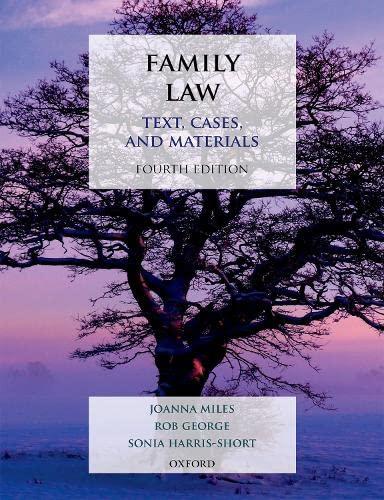Question
Class action refers to a legal action undertaken by one or more plaintiffs on behalf of themselves and all other persons harmed in the alleged
- Class action refers to
- a legal action undertaken by one or more plaintiffs on behalf of themselves and all other persons harmed in the alleged wrong.
- a group of people that is not recognized by the courts and that may not sue or be sued.
- the out-of-court procedure by which one of the parties agrees to pay a sum of money in return for a waiver by the other party of all rights arising from a grievance.
- a case that has already been decided by a court and cannot be brought before a court again.
- the party that commences a private legal action against another party.
2. of the follow statements about small claims court is true?
- Small claims court requires a lawyer to present the case.
- Court costs cannot be recovered if the party wins in small claims court.
- Small claims court uses the same formal legal procedures as superior court.
- Small claims court can handle any case the plaintiff feels he can address without a lawyer.
- Small claims court has limited monetary jurisdiction.
3.What are some disadvantages to alternative dispute resolution (ADR) over litigation?
- Some disadvantages are: no time and cost savings, no unique settlement possible, and no appeal process.
- Some disadvantages are: no cost or time savings, no official record of the proceeding, and no continued relationship between the parties.
- Some disadvantages are: discovery is required, no court enforcement of the judgment, and no precedential value of the decision.
- Some disadvantages are: no right to discovery or appeal, and no precedential value to the decision.
- Some disadvantages are: decisions are not binding, no way to collect a settlement, and no continued relationship between the parties.
4.What is the main difference between mediation and negotiation?
- Mediation involves a mandatory settlement clause while negotiation allows the case to proceed to trial.
- Mediation involves just the parties while negotiation involves a neutral third party.
- Mediation involves a neutral third party decision maker while negotiation involves a neutral third party facilitator.
- Mediation is only allowed in criminal cases while negotiation can be used in any case.
- Mediation involves a neutral third party while negotiation just involves the parties.
5.When is mediation not appropriate?
- When the parties need a quick resolution
- When the parties do not trust each other at all
- When the parties wish to remain in business together
- When the parties want to settle
- When the parties do not want sensitive information made public
6.What is a disadvantage of mediation?
- There is no way to compel the parties to produce evidence.
- Mediation can force parties to accommodate each other.
- The parties cannot have a continued relationship.
- Mediation cannot involve a third party.
- There is no way to create solutions the law does not provide.
7.what of the following is not a reason to use alternative dispute resolution (ADR) in online disputes?
- ADR allows the decision to be precedential in all jurisdictions a company operates in.
- ADR allows parties to keep information about issues with their sites private.
- ADR is less expensive.
- ADR does not require the parties to be in the same room.
- ADR is quicker than a court case.
8.Is violating a provincial environment regulation a criminal matter?
- No. The province does not have the right to regulate the environment so such a regulation would be unenforceable.
- Yes. The violation of any regulation is a matter for the criminal courts.
- No. Normally any violation that results in potential imprisonment would be criminal but since a province cannot enact criminal legislation, it is not.
- No. Although an environmental offense can result in fines or imprisonment, it is a quasi-criminal matter, based on an enactment other than the Criminal Code and related legislation.
- Yes. A person is subject to imprisonment for environmental regulation violations so it is a criminal matter.
9.what of the following questions is a matter of fact that would be left to the jury (if one is present)?
- Is the witness's statement admissible as evidence?
- Was the defendant at the home in question?
- Should strict liability be applied in this situation?
- Was the landlord obligated to keep the building in good repair?
- Does the fact the landlord was unaware of his obligation change that obligation?
10.what of the following situations would be most likely to be granted leave to appeal to the Supreme Court of Canada?
- Two companies want to contest their settlement because they changed their minds.
- A judge from Nova Scotia held a federal law unconstitutional while a judge from British Columbia held the same law was constitutional.
- A landowner wants to appeal his fine for violating a local littering regulation.
- A person appeals his speeding ticket because the officer was not following proper procedure.
- Two Quebec superior court judges disagree about the interpretation of a unique provincial law.
Step by Step Solution
There are 3 Steps involved in it
Step: 1

Get Instant Access to Expert-Tailored Solutions
See step-by-step solutions with expert insights and AI powered tools for academic success
Step: 2

Step: 3

Ace Your Homework with AI
Get the answers you need in no time with our AI-driven, step-by-step assistance
Get Started


